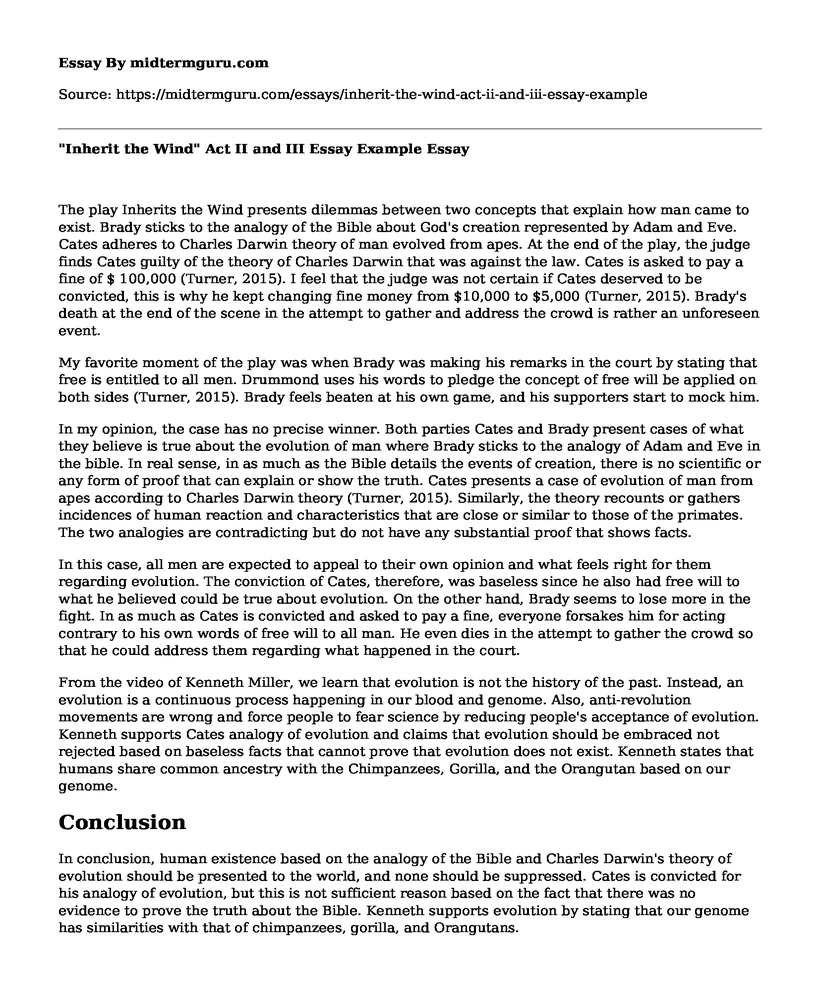The play Inherits the Wind presents dilemmas between two concepts that explain how man came to exist. Brady sticks to the analogy of the Bible about God's creation represented by Adam and Eve. Cates adheres to Charles Darwin theory of man evolved from apes. At the end of the play, the judge finds Cates guilty of the theory of Charles Darwin that was against the law. Cates is asked to pay a fine of $ 100,000 (Turner, 2015). I feel that the judge was not certain if Cates deserved to be convicted, this is why he kept changing fine money from $10,000 to $5,000 (Turner, 2015). Brady's death at the end of the scene in the attempt to gather and address the crowd is rather an unforeseen event.
My favorite moment of the play was when Brady was making his remarks in the court by stating that free is entitled to all men. Drummond uses his words to pledge the concept of free will be applied on both sides (Turner, 2015). Brady feels beaten at his own game, and his supporters start to mock him.
In my opinion, the case has no precise winner. Both parties Cates and Brady present cases of what they believe is true about the evolution of man where Brady sticks to the analogy of Adam and Eve in the bible. In real sense, in as much as the Bible details the events of creation, there is no scientific or any form of proof that can explain or show the truth. Cates presents a case of evolution of man from apes according to Charles Darwin theory (Turner, 2015). Similarly, the theory recounts or gathers incidences of human reaction and characteristics that are close or similar to those of the primates. The two analogies are contradicting but do not have any substantial proof that shows facts.
In this case, all men are expected to appeal to their own opinion and what feels right for them regarding evolution. The conviction of Cates, therefore, was baseless since he also had free will to what he believed could be true about evolution. On the other hand, Brady seems to lose more in the fight. In as much as Cates is convicted and asked to pay a fine, everyone forsakes him for acting contrary to his own words of free will to all man. He even dies in the attempt to gather the crowd so that he could address them regarding what happened in the court.
From the video of Kenneth Miller, we learn that evolution is not the history of the past. Instead, an evolution is a continuous process happening in our blood and genome. Also, anti-revolution movements are wrong and force people to fear science by reducing people's acceptance of evolution. Kenneth supports Cates analogy of evolution and claims that evolution should be embraced not rejected based on baseless facts that cannot prove that evolution does not exist. Kenneth states that humans share common ancestry with the Chimpanzees, Gorilla, and the Orangutan based on our genome.
Conclusion
In conclusion, human existence based on the analogy of the Bible and Charles Darwin's theory of evolution should be presented to the world, and none should be suppressed. Cates is convicted for his analogy of evolution, but this is not sufficient reason based on the fact that there was no evidence to prove the truth about the Bible. Kenneth supports evolution by stating that our genome has similarities with that of chimpanzees, gorilla, and Orangutans.
References
Turner, J. G. (2015). Intelligently Designed: How Creationists Built the Campaign against Evolution. The Journal of Southern History, 81(2), 500.
Cite this page
"Inherit the Wind" Act II and III Essay Example. (2022, Aug 18). Retrieved from https://midtermguru.com/essays/inherit-the-wind-act-ii-and-iii-essay-example
If you are the original author of this essay and no longer wish to have it published on the midtermguru.com website, please click below to request its removal:
- Literary Critical Analysis of The Yellow Wall-Paper
- Literary Analysis Essay on "The Storm" by Kate Chopin
- A Research on Chinua Achebe's Things Fall Apart
- Literary Analysis Essay on "Punished by Rewards" by Alfie Kohn
- Essay Sample on Supply Chain Logistic Drivers
- Literary Analysis Essay on "Pheno Timers", "For Me From You "And "the Poem at Thirty-Nine"
- Edgar Allan Poe: Controversial Genius & Father of Mystery - Essay Sample







